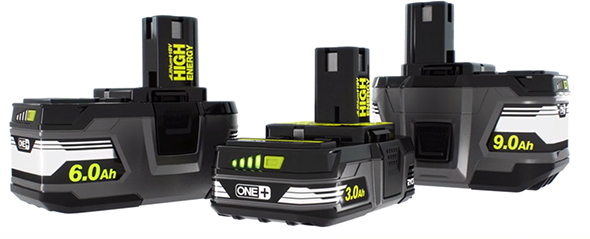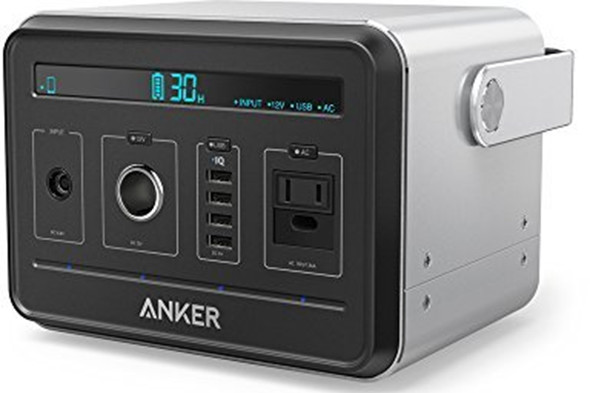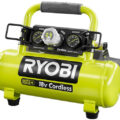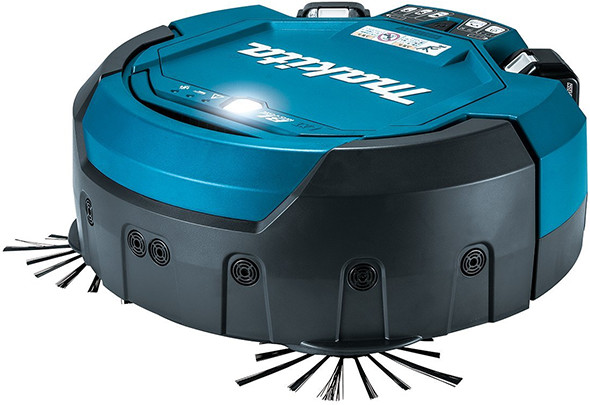![Milwaukee M18 12Ah High Output Battery]()
A couple of days ago, someone asked me when we might see a Milwaukee M18 cordless power station.
![Dewalt Portable Power Station with Power Strip and Chargers]()
Shown here, Dewalt has a 4x 20V Max portable power station.
![Ryobi RYi1802B5 18V Battery Powered Inverter Generator]()
Ryobi just announced their 40V Max portable power station.
![Ego Nexus Cordless Portable Power Station PST3042]()
Ego recently announced their 2000W continuous Nexus portable power station.
So, when can we expect to see something similar from Milwaukee? Thank you to Ron for the great question!
Let’s start by asking some different questions.
Is This Something Milwaukee Tool Can Do?
Sure. Combine the voltage of a couple of M18 cordless power tool batteries, pass the higher voltage through a DC to AC converter, and voila, you have an AC power source, derived from DC battery packs.
DC power sources are convenient, and have been growing in popularity. There’s no noise compared to a gas generator, and although batteries wear over time and need to be replaced, they’re quick to plug in and charge up at the end of the day.
For heavy use, gas generators are still king. But for light or even medium demand applications, a battery-powered source can be useful. You won’t get all-day use out of a set of batteries, or maybe you can depending on the types of tools or applications, but there are conveniences compared to utilizing a gasoline generator.
Can Milwaukee come out with a cordless power tool station right now? Absolutely.
Is This Something Milwaukee Tool Wants to Do?
Here’s the thing – Milwaukee Tool and other brands have been striving for a cordless jobsite. There are still plenty of corded tools and equipment, many of which don’t yet exist as cordless tools. Other times, users’ needs might vary.
If you want a cordless air compressor, you’re limited to just 3 brands.
If you want a cordless 10″ table saw, you’re out of luck – for now.
Cordless 12″ sliding miter saw? There’s only one brand available right now.
Full-sized dust extractor?
Full-sized router?
Maybe your favorite sander isn’t yet available as a cordless sander, or if it is, maybe you’re not happy about the price.
While a DC to AC cordless battery power station doesn’t quite “cut the cord” in the way that professional power tool brands have been moving towards, it can simplify jobsite setups in a lot of different settings.
I think that a cordless power station is something that Milwaukee could very well want to do.
Jobsite adoption of a portable power station might not be very widespread, at least at first, but there are also very many Milwaukee M18 users who would be happy to have an M18-equipped power station that can be used into the weekends too.
If you ask me, I think that a Milwaukee cordless power station is something they might be willing to do.
Why Haven’t We Seen One Yet?
Well, if you’re going to do something, you might as well do it right and make it as compelling as possible.
![Milwaukee M18 12Ah High Output Battery]()
With their new M18 High Output battery packs, especially the HD 12.0Ah pack, a Milwaukee M18 portable power station is going to be very effective, or at least much more effective. A full kit featuring 12Ah battery packs would likely require a hefty investment, but the XC6.0, HD9.0, and maybe even XC5.0 battery packs still hold a lot of charge capacity.
Milwaukee takes pride in their “everything fits” philosophy, and so you can be sure that even if their High Output batteries might provide top performance and runtime, their other M18 batteries will still work.
Still, although cordless power tool battery packs now hold more charge capacity than ever before, and other brands have apparently seen fit to develop portable power stations, an eventual Milwaukee model is not guaranteed to be on their roadmap. Will customer demand be great enough to justify development and marketing of such a product?
What Might it Look Like?
![Milwaukee Packout Tool Storage Large Tool Box]()
Milwaukee’s Packout modular tool box system launched two years ago, and they announced new products for the line last year.
Maybe we’ll see a rolling power station, similar to their rolling tool box, meant to the bottom of a stack of a Packout tool boxes. Maybe it’ll be a mid-section box. Or maybe it’ll be a top-section device, similar to Dewalt’s portable power station.
It’s very reasonable to assume that if Milwaukee does come out with an M18-compatible portable power station, it’ll be compatible with their Packout storage system.
That said, raise your hand if you’d like to see a Packout-compatible vacuum. Packout-compatible cordless air compressor? Products like these might only be a matter of time.
The Likelihood of a Milwaukee M18 Cordless Power Station?
Well… if it’s not on their roadmap, perhaps Ryobi’s portable power station will be treated as a test of the market. While Milwaukee cordless power tools are developed by Milwaukee product managers and engineers, and Ryobi power tools are developed by TTI North America, we have seen evidence of communication between the brands, at least at high levels.
Between the different TTI brands, components and parts are different, production methods likely also differ, and resultant quality is also different. But it would be foolish not to look at release trends and not make the assumption that information and even data is shared between the brands, at least perhaps on a limited or case by case basis.
For instance, there are four cordless oil pulse drivers on the market, and three of them are made by TTI. There have been numerous instances where Milwaukee Tool, Ryobi, and Ridgid have followed each other’s innovations and entry into new markets and product categories.
Doubts
Is this something that Milwaukee Tool can produce? Yes. Are they interested in developing such a tool? I’d say the answer is yes. Can they do so at a competitive and compelling price point? Bosch launched a mobile battery bank for the European market more than 3 years ago. Can you find that Bosch product in the USA? No.
The market has to be open to a product before it can be realized. Meaning, the question isn’t so much whether Milwaukee Tool can and wants to come out with a portable power station, but whether enough pro users want to buy one, to justify its existence.
Thus, the answer to “when will Milwaukee launch a cordless power station?” really depends on the answer to another question. So, let me ask YOU:
(When) Would you buy a Milwaukee M18 cordless power station?
Other Thoughts
All this talk is about the potential for a Milwaukee Tool portable battery-powered AC source, for powering corded tools and devices.
What about an AC adapter for their cordless power tools?
![Metabo HPT MultiVolt AC Adapter]()
Hitachi, or rather Metabo HPT, has come out with an AC adapter for their MultiVolt cordless power tools. Los Gatos, a now-defunct 3rd party company, made a similar product with different brand connections, but they seem to have disappeared in the years since.
Dewalt has such an adapter for their 120V Max cordless power tools, namely their two FlexVolt 12″ miter saws.
We might very well see something like this from Milwaukee, but probably not until or unless they come out with some kind of battery-multiplier system, such as an M18 x 2 table saw or similar.
Personally, I think a DC battery-powered AC source is more likely than an AC-powered DC source.
Update: Glossary
To clear up some confusion that came to light in the comments section:
Portable Power Station: The focus of this post is on a hypothetical Milwaukee Tool M18 portable power station, a device which would utilize M18 cordless power tool batteries to output an AC electrical source for the operation of corded power tools in the absence of a typical AC outlet.
A portable power station uses DC battery sources to output AC electrical power.
For instance, a portable power station could potentially power a corded router, worm drive circular saw, table saw, or shop vacuum.
Charging Station: An existing product that is plugged into an AC source for recharging M18 cordless power tool batteries. Portable power stations usually have battery charging capabilities, but charging stations can not power corded tools. Charging stations use AC power to recharge DC batteries.
A charging station can only charge batteries. At most, some also have USB charging ports.
Note: THIS is probably why some brands describe their portable power stations as battery-powered inverter generators.



























































































 cordless tools and accessories! The beauty of our 20V system is the ability to operate any tool in our lineup without unnecessary additional batteries lying around your shop – it’s that simple.
cordless tools and accessories! The beauty of our 20V system is the ability to operate any tool in our lineup without unnecessary additional batteries lying around your shop – it’s that simple.











